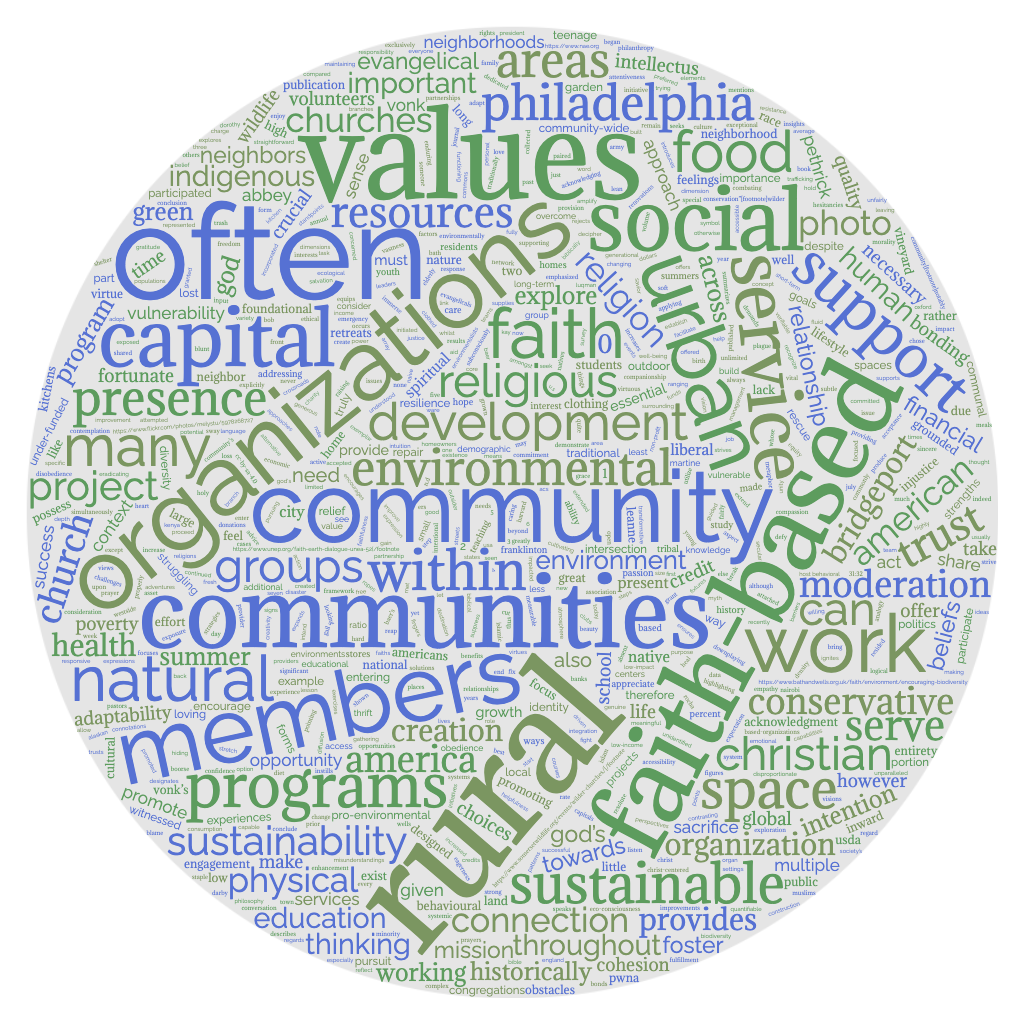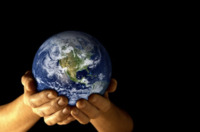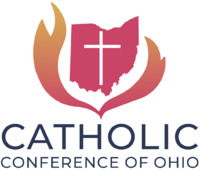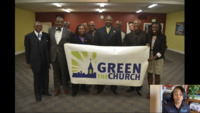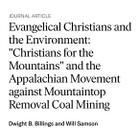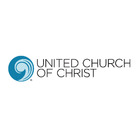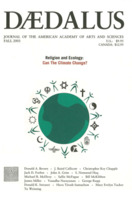Search
19 items
-
Justice for Each Generation
Justice for Each Generation started with the landmark case, Juliana v. U.S. Twenty-one youth had filed a lawsuit against the United States government for its role in causing climate change and violating their right to life, liberty, and property, while also failing to protect essential public resources. They are calling for sermons from youth and adults of all faiths as a collective statement that sends a signal to the rest of society. -
The Essential Presence of Faith-Based Organizations in Sustainable Community Development
This chapter from the student-written book “Emerging Perspectives on Religion and Environmental Values in America” explores the presence of religious organizations providing service to local communities. It discusses the broad range of faith-based organizations and their many projects, and how engaging with these organizations and programs can improve connections to one's environment and spirituality. Below is the first paragraph of the chapter to introduce the discussion.
"The presence of faith-based organizations as social, human, and cultural capital within every community, regardless of demographic dimension, politics, race, and income demonstrate the resilience of religion as an asset essential to the cultivation of sustainable community development. Throughout history, religious groups have served as providers of essential services for the less fortunate, and advocates for social justice and equity in both rural and urban communities. Despite trying circumstances, this resolute effort over time and their relative success in providing support to those in need, has afforded faith based-organizations credibility, and in some cases their role is indispensable." -
Critique of Religious Patriarchy
"This supplement is about transcending religious patriarchy in order to foster integral human development and a healthy mutuality between humans and the human habitat. Some meditations are proposed on the mysteries of the creation, the incarnation, and the redemption. They explore the Christian understanding that all men and women are consubstantial in one and the same human nature, and are consubstantial with Jesus Christ as to his humanity. The meditations are based on a layman's reading of the Sacred Bible, the Catechism of the Catholic Church, and the Theology of the Body as they pertain to the consubstantial complementarity of man and woman, which transcends the patriarchal binary of mutually exclusive male-female opposites. This understanding of the "complementarity in consubstantial unity" of man and woman applies to all the sacraments, sheds light on the great nuptial mystery of Christ and the Church, and would seem to support the ordination of women to the ministerial priesthood and the episcopate. The meditations are preceded by recent news on patriarchy in religion, society, and human ecology, and are followed by articles and research notes, a summary of points for discernment on the ordination of women, an annotated timeline of religious patriarchy in the Judeo-Christian tradition, and links to relevant literature, substantive research, and the synodal process of discernment currently underway in the Catholic Church." -
Threat of Global Warming/Climate Change - 2006 Statement of Conscience
This resource contains the climate statement of the Unitarian Universalist Association.
"Earth is our home. We are part of this world and its destiny is our own. Life on this planet will be gravely affected unless we embrace new practices, ethics, and values to guide our lives on a warming planet. As Unitarian Universalists, how can our faith inform our actions to remedy and mitigate global warming/climate change? We declare by this Statement of Conscience that we will not acquiesce to the ongoing degradation and destruction of life that human actions are leaving to our children and grandchildren. We as Unitarian Universalists are called to join with others to halt practices that fuel global warming/climate change, to instigate sustainable alternatives, and to mitigate the impending effects of global warming/climate change with just and ethical responses. As a people of faith, we commit to a renewed reverence for life and respect for the interdependent web of all existence." -
How Religion Intersects With Americans' View on the Environment
Through this study, they intended to obtain information about how religious Americans view climate change. This article explains the results of a survey. It shows how some religious Americans express little concern about climate change, and carry the belief that “there are much bigger problems in the world, that God is in control of the climate.” Additionally, some say that “they do not believe the climate is actually changing.” This survey also sheds light on other concerns religious Americans carry, such as fear surrounding the consequences of environmental regulations (fewer jobs, increased energy prices, and loss of individual freedoms).
Additionally, the survey extends to other religious affiliations as well as the religiously unaffiliated population. -
Turning Around Our Relationship with Earth is a Teshuvah Project
The author recounts an unsettling encounter with a utility worker who downplayed the environmental harm of her gas leak. From here, she explains the true negative impacts of methane emissions on both people and the climate, and encourages us to act in a way that "turns around our relationship with Earth". She connects this with the Jewish tradition of Teshuvah, the time in between Rosh Hashanah and Yom Kuppur meant for repentance. -
Care for Creation - Catholic Conference of Ohio
"The Catholic Bishops of Ohio invite you to study the issues related to the stewardship of God’s creation. Care for the environment is a fundamental principle within Catholic Social Teaching. We applaud efforts already underway in many Catholic homes and institutions that help conserve energy, protect the environment, and advance a greater understanding of faithful stewardship. We hope that Catholic families and institutions around the state will continue in such efforts."
This resource includes a statement calling to care for God's creation and contains information and links to several other resources related to religion and environmentalism. -
Al-Mizan: Covenant for the Earth
"The Covenant presents an Islamic outlook on the environment in a bid to strengthen local, regional, and international actions to combat the triple planetary crises defined by the United Nations as climate change, biodiversity loss and pollution. It is a global endeavour to engage Muslims from all levels of society in the development and adoption of this call...
Al-Mizan - A Covenant for the Earth is a restatement of the principles governing the protection of nature in a form that meets current challenges. It examines the ethics behind the social patterning of human existence and enquires into how they could be brought to life today working in harmony with the heartbeat of the natural world." -
Voting and Our Common Home: Reflections from the Catholic Tradition
This resource shares information and resources related to the importance of voting for environmental issues on the basis of Catholic religious beliefs. This document is available in both English and Spanish and raises multiple different issues and considerations connecting religion, environmental issues, and voting. -
Sikhism and Caring for the Environment in Practice
This article describes Sikh values and how they relate to Sikh environmental beliefs. The Sikhs believe that every man and woman, regardless of status or creed, is born with unalienable rights to happiness and liberty. This belief leads to the Sikh stance on environmental ethics, arguing that fighting climate change is a universal effort that can only be achieved with love and compassion for humanity in mind. -
The Black Church & the Environmental Age
This course, created by Green the Church, aims to help people learn about the relationship of Black Churches and their congregations with the environmental movement. It discusses environmental issues specific to Black communities and how Black Churches can be involved and mobilize around them. -
Evangelical Christians and the Environment: “Christians for the Mountains” and the Appalachian Movement against Mountaintop Removal Coal Mining
This source deals with past research that connects Evangelicalism with anti-environmental values. The organization “Christians for the Mountains” seems to be contradictory to this prior research. Through a variety of qualitative methods, this research paper goes into the actual attitudes at play and how this might apply more broadly -
Our common home
This is a booklet guide to caring for our living planet created through a joint initiative of the Holy See and Stockholm Environment Institute. This booklet contains ten sections detailing topics such as climate, air, water, and actions to combat climate change. It was partly inspired by and contains quotes from Pope Francis' Laudato Si'. -
Protecting nature, act of faith: Muslim women are leading the charge on climate activism
In this news article and accompanying interview, by the Canadian Broadcasting Association (CBC), they highlight a Muslim women, Memona Hossain, who identifies as a Muslim activist. In her research, she has found that religion can play a significant role in climate activism, often viewing it as empowerment, as a lot of the Muslim women she interviewed were involved with climate action because of their faith. These women believed that protecting nature was a form of worship and that they needed to take care of this gift from Allah, the Arabic word for God. -
A Movement Is Born: Environmental Justice and the UCC
After the ban of PCBs in the late 1970s, a landfill in Warren County, North Carolina had been designated as a place of disposal. This county had one of the highest rates of black residents, as well as poverty rates. This sparked leaders in the United Church of Christ including Dollie Burwell, Rev. Leon White, Rev. Benjamin Chavis Jr. and the UCC’s Commission for Racial Justice to become a leading force in the environmental justice movement. This article highlights the work of these leaders in fighting against environmental racism. -
Season of Creation 2023: Let Justice and Peace Flow
"Prophet Isaiah proclaims: 'Listen carefully, I am about to do a new thing, now it will spring forth; will you not be aware of it? I will even put a road in the wilderness, rivers in the desert.' (Isaiah 43: 19) Biodiversity is being lost at a rate not seen since the last mass extinction. The futures of young people are threatened by the cascading impacts of the loss of biodiversity and a changing climate.
The urgency grows and we must make visible peace with Earth and on Earth, at the same time that justice calls us to repentance and a change of attitude and actions. As we join the river of justice and peace with others then hope is created instead of despair.
We invite you to use these resources and share them with your church, pastor or other regional authority to join the Season of Creation, and even spread the word to local media." -
Faith and the Environmental Movement: A Franciscan Perspective
This blog post was written by a member of WE ACT, which is an environmental justice-based organization located in Harlem, NYC. The post discusses the relationship between Catholicism and environmentalism. The author argues that Catholics are key environmental changemakers because Catholic teachings and religious leaders, like Pope Francis, emphasize protection for God's creation and care for the poor. -
Environmental underpinnings in Rosh Hashanah Liturgy: We are stewards of our world…take better care of the earth!
David Golinkin explains in this article the connection between the Jewish holiday, Rosh Hashanah, and environmentalism. He explains certain Jewish phrases and their significance in respect to our responsibility to the world. -
Envisioning the Daoist Body in the Economy of Cosmic Power
"From a sociological perspective, religious traditions represent and construct the collective values and systems of meaning of human societies. As such, religious traditions influence the way their adherents interpret their experience of the world and, consequently, influence their actions upon it. Religious ideologies, however, are themselves always in medias res. Even though their adherents may uphold an eternal vision of archaic principles handed down from the gods, in actuality this vision is continuously renegotiated and reconstructed in conversation with the changing demands of historical and cultural context."


